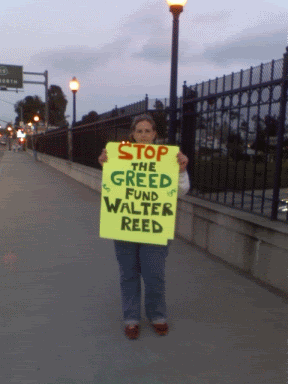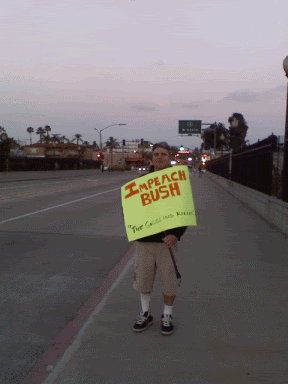Over the flip you will find the complete text of DiFi’s speech on the Senate Floor in favor of S.214 to require Senate confirmation of the US Attorneys. It is expected to come to a vote in the Senate tomorrow morning. Warning, it’s quite long.
Senator Feinstein Urges Senate Passage of Legislation to Ensure Senate Confirmation of U.S. Attorneys
Washington, DC – U.S. Senator Dianne Feinstein (D-Calif.) today spoke on the Senate Floor to urge passage of legislation she has cosponsored with Senators Arlen Specter (R-Pa.), Patrick Leahy (D-Vt.), and Charles Schumer (D-N.Y.) to ensure Senate confirmation of U.S. Attorneys (S.214).
The Senate is expected to vote on the bill on Tuesday morning, no later than 11:30 a.m.
Under a provision inserted without notice into the USA Patriot Act reauthorization last year, the law was changed so that if a vacancy arises, the Attorney General may appoint a replacement for an indefinite period of time – thus completely avoiding the Senate confirmation process.
Senators Feinstein, Specter, Leahy, and Schumer have cosponsored legislation to restore the process in place before 2006. It would allow the Attorney General to appoint interim U.S. Attorney for 120 days. If after that time the President has not sent up a nominee to the Senate and had that nominee confirmed, then the authority to appoint an interim U.S. Attorney would fall to the district court. This was the law from 1986 to 2006.
Following is the text of Senator Feinstein’s remarks on the Senate Floor today, as delivered.
“Mrs. FEINSTEIN. Mr. President, I rise today to speak in support of S. 214, the bill the leader just referred to.
This is a bill that simply reinstates the Senate’s role in the confirmation process of U.S. attorneys. It is a bill I introduced with Senator Leahy on January 9, 2007, days after I first learned in early December that officials from main Justice called a handful of U.S. attorneys from around the country and forced them to resign their positions without cause.
At that time, I had very little information and was unaware of exactly what had occurred and why.
As I looked into it, I learned that in March of 2006, the PATRIOT Act was reauthorized and a change was made in the law. It was made in conference without Democratic Senators present. To the best of my knowledge, it was made without the knowledge of any Senator, Republican or Democrat.
It is my understanding this was a request from the Justice Department that was presented by Will Moschella to the staff of the Judiciary Committee and, without the knowledge of Senators, was put into the bill. It then gave the President the authority essentially to appoint a U.S. attorney without confirmation for the remainder of his term.
The bill, S. 214, that is before the Senate today simply returns the law the way it was before this action took place in March of 2006.
Today, just a little more than 2 months after I first learned about this situation, additional information has come to light. But rather than alleviating the concerns and answering questions, we are now faced with new and more serious allegations.
In fact, the big question looming over this debate is whether the Attorney General and others in the Bush administration have misled the Congress and the public.
If true, this is very serious.
There are also allegations that the firings were done because the Department of Justice and the White House were both unhappy with some of the U.S. attorneys’ handling of public corruption cases.
If true this, too, is very serious.
We now know that at least eight U. S. attorneys were forced from office, and that despite shifting rationales for why, it has become clear that politics has, in fact, played some role.
Last week, we learned that the White House was involved in this process and that discussions took place with such prominent figures as Presidential adviser Karl Rove and former-White House Counsel Harriet Miers.
We also learned last week that these discussions began well over 2 years ago, almost immediately following the 2004 election, and it appears from recently released e-mails that Attorney General Gonzales was personally consulted, even while he was still serving as White House Counsel.
This information also shed new light on who was being targeted for firing and why.
It is this last point — why some were targeted — that has served to raise more questions and more significant concerns.
We have learned that as many as six of the eight U.S. attorneys who were involved with public corruption cases. While we don’t know what role this played in their selection, it is an unavoidable fact that raises serious questions.
Today, as the Senate begins the debate on the `Preserving United States Attorney Independence Act,’ I would like to discuss some of what we have learned in greater detail and some of the reasons this bill is so necessary.
I believe it is important to look at how interim U.S. attorneys have been appointed over the years.
There appears to be an assumption by the Bush administration that the Attorney General should have an exclusive authority to appoint interim U.S. attorneys.
But, in fact, history paints a much different picture.
When first looking into this issue, I found that the statutes had given the courts the authority to appoint an interim U.S. attorney and that this dated back as far as the Civil War. Specifically, the authority was first vested with the circuit courts in March of 1863.
Then, in 1898, a House of Representatives report explained that while Congress believed it was important to have the courts appoint an interim U.S. attorney:
`There was a problem relying on circuit courts since the circuit justice is not always to be found in the circuit and time is wasted in ascertaining his whereabouts.’
Therefore, at that time, the interim appointment authority was switched to the district courts; that is, in 1898 it was switched to the district courts.
Thus, for almost 100 years, the district courts were in charge of appointing interim U. S. attorneys, and they did so with virtually no problems.
This structure was left undisturbed until 1986 when the statute was changed during the Reagan administration. In a bill that was introduced by Senator Strom Thurmond, the statute was changed to give the appointment authority to the Attorney General, but even then it was restricted and the Attorney General had a 120-day time limit.
After that time, if a nominee was not confirmed, the district courts would appoint an interim U.S. attorney. The adoption of this language was part of a larger package that was billed as technical amendments to criminal law, and thus there was no recorded debate in either the House or the Senate and both Chambers passed the bill by voice vote.
Then, 20 years later, in March 2006 — again without much debate and again as a part of a larger package — a statutory change was inserted into the PATRIOT Act reauthorization.
This time, the Executive’s power was expanded even further, giving the Attorney General the authority to appoint an interim replacement indefinitely and without Senate confirmation.
Unfortunately, not one year after securing this new authority, abuses have come to light.
Almost immediately after I first spoke about what I had learned in January, the Attorney General called me to tell me that I had my facts wrong. However, he also sent up his staff to confirm that `less than 10′ U.S. attorneys had been asked to resign on December 7, 2006.
Despite this, the Attorney General adamantly denied politics had any role in the process.
In fact, in an interview with an Associated Press reporter on January 16, 2007, the Attorney General was asked about the charges of political motivation, and he responded: `Nothing could be further from the truth.’
He further stated in response to your comment, Mr. President, that the Department tried to avoid Senate confirmation to reward political allies: `We in no way politicized these decisions.’
Two days later, the Attorney General reiterated this position when he came before the Senate Judiciary Committee on January 18 of this year and said: `I would never, ever make a change in the United States attorney position for political reasons.’
That is a categorical and definitive monosyllabic statement.
However, the Department had to backtrack when it became evident that the former U.S. attorney from your State, Mr. President, Arkansas, Bud Cummins, was simply replaced in order to make room for Tim Griffin, who had served as Karl Rove’s special assistant and had been in charge of opposition research against Democratic candidates for the Republican National Committee.
Less than a month later, the Deputy Attorney General confirmed this fact when he testified before the Senate Judiciary Committee on February 7, 2007.
At that time, he said:
`The fact is there was a change made [in Arkansas] that was not connected, as we said, to the performance of the incumbent, but more related to the opportunity to provide a fresh start with a new person in that position.’
Deputy Attorney General McNulty, however, went on to say that all the others who were fired were fired for performance-related reasons. But this, too, was not the final explanation.
The Department next tried to justify the firings by arguing that the U.S. attorneys were let go because there were `policy disagreements.’
Then the Attorney General said that these U.S. attorneys had `lost [his] confidence.’
So there are three different reasons so far. Now, most recently, the explanation has been that the Department thought it `could do better’ — the fourth explanation.
These explanations are as slippery as they are misleading. Rather, what documents and e-mails demonstrate is that none of these reasons was the deciding factor that led some U.S. attorneys to be targeted for firing.
Instead, it appears these individuals lost their jobs because a number of Department of Justice officials and possibly — we don’t know but possibly — White House officials did not judge them to be sufficiently loyal or did not like the cases they were prosecuting or simply wanted to put in new, politically connected, young lawyers.
It appears this way because contained in the documents that were released last week is an outline of the Department of Justice’s plan for how to determine who should be let go and who should stay.
The first step of that plan was to create a new rating system to evaluate all 93 U.S. attorneys. This was to be separate from the independent performance reports, called EARS reports.
Those reports routinely occurred and objectively examined each U.S. Attorney’s Office by evaluating their prosecution caseloads, their management, their willingness to follow Department priorities, and their ability to work cooperatively with the FBI, with the DEA, and with other client agencies.
This rating system was developed back in February of 2005, and one of the primary factors to be considered was loyalty to the administration.
One e-mail describing the ratings stated:
`Recommended retaining strong U. S. attorneys who have produced, managed well, and exhibited loyalty to the President and Attorney General. Recommended removing weak U.S. attorneys who have been ineffectual managers and prosecutors, chafe against administration initiatives.’
Under this system, two of the eight fired U.S. attorneys received strong evaluations and recommended retaining while three received recommended removing.
One of the U.S. attorneys who received a `recommended removing’ rating was Carol Lam from the Southern District of California. She received this low rating despite her many accomplishments and despite her positive performance evaluations.
I am familiar with Carol Lam’s career because she served in San Diego. In that position, she has taken on some of the biggest cases and really made a positive impact on the community she has served.
But that is not just my opinion. Leaders throughout San Diego have sung her praises. Let me give a few examples:
Dan Dzwilewski, head of the FBI office in San Diego:
`Carol has an excellent reputation and has done an excellent job given her limited resources.’ Then, when asked whether she had given proper attention to gun cases, he said: `What do you expect her to do? Let corruption exist? `
Adele Fasano, the San Diego Director of Field Operations, Customs and Border Patrol for the United States, said:
`[We have] enjoyed a strong, collaborative relationship with the U. S. Attorney’s Office to combat smuggling activity through the ports of entry.’
City attorney for San Diego, Michael Aguirre, said:
`[Carol Lam] has been by far the most outstanding U.S. Attorney we’ve ever had…she’s won a national reputation as one of the top prosecutors in the country.’ This is the city attorney.
Michael Unzueta, Special Agent in Charge, Immigration and Customs Enforcement:
`Carol Lam is truly an example of a dedicated public servant and a law enforcement professional. We will miss her leadership.’
John Cooper, Special Agent in Charge, Naval Criminal Investigative Service:
`The departure of Ms. Lam will be a great loss… Ms. Lam is the consummate law enforcement executive who leads by example.’
And Alan Poleszak, Acting Special Agent in Charge, Drug Enforcement Agency:
`The on-going prosecution of [the] Javier Arellano Felix drug trafficking organization is both historic and noteworthy…[Ms. Lam’s] commitment to Federal law enforcement in this judicial district, county, and city, will be missed.’
We should take note of the fact that the Arellano Felix organization is one of the largest and most dangerous Mexican drug cartels known. They operate out of Tijuana. They have killed hundreds of people. They have murdered Mexican DAs, they have murdered Mexican judges, and they are a blight. This U.S. attorney took them on. I will tell my colleagues more about that in a moment.
The reason Carol Lam was well respected is because she worked hard and she took on the tough fights. She has had success after success. Let me give some examples.
· In September of 2005, the president of the San Diego chapter of Hell’s Angels pled guilty to conspiracy to commit racketeering. Guy Russell Castiglione admitted he conspired to kill members of a rival motorcycle gang, the Mongols, to sell methamphetamine.
· In December 2005, Daymond Buchanan, member of Hell’s Angels, was sentenced to 92 months in Federal prison for participating in a pattern of racketeering as well as inflicting serious bodily injury upon one victim.
At that time, Ms. Lam announced:
`With the president, sergeant at arms, secretary, treasurer, and six other members of the Hell’s Angels convicted of racketeering charges and facing long prison sentences, the San Diego chapter of the Hell’s Angels has been effectively shut down for the foreseeable future.’
· If that isn’t enough, in September of 2006, Jose Ernesto Beltran-Quinonez, a Mexican national, pled guilty to making false statements about weapons of mass destruction. Mr. Quinonez was sentenced to 3 years in Federal prison for making up a story about Chinese terrorists sneaking into the United States with a nuclear warhead. The hoax prompted a massive investigation, Federal warnings, discussions at one of President Bush’s security briefings, and a nationwide hunt for the group of Chinese supposedly plotting the attack.
· In December 2006 Mel Kay, of Golden State Fence Company, and Michael McLaughlin pled guilty to felony charges of hiring illegal immigrants and agreed to pay fines of $200,000 and $100,000 respectively. The company, which built much of the fence near Otay Mesa, agreed separately to pay $5 million on a misdemeanor count, one of the largest fines ever imposed on a company for an immigration violation.
Was Carol Lam praised for this work? No, she was sent packing without an explanation. Those were not her only cases.
She gained a national reputation for her work on public corruption cases. I think it is important to note that public corruption is the FBI’s second highest priority after terrorism-related investigations.
Now, I didn’t know this, but the Judiciary Committee had an oversight hearing of the FBI on December 6, 2006, where the Director, Bob Mueller, came before us and he mentioned what their priorities were, and he said: `Terrorism first, and then public corruption second, and crime was way down on the list.’
As a matter of fact, I found it rather startling, and I questioned him about that. He said, with some emphasis, those are our priorities, and we believe if we don’t do public corruption, nobody else will.
So the FBI has as its second highest priority public corruption. The FBI is going to be out there putting together cases. Who prosecutes these cases? U.S. attorneys.
The FBI’s second highest priority, and Carol Lam rose to this challenge.
· In March of 2004, her office convicted Steven Mark Lash, the former chief financial officer of FPA Medical Management, for his role in defrauding shareholders and lenders of FPA. The collapse of the company left more than 1,600 doctors being owed more than $60 million and patients reporting they were unable to obtain medical care because this company had ceased paying providers.
· In January of 2005, Mark Anthony Kolowich, owner of World Express Rx, pled guilty to conspiracy to sell counterfeit pharmaceuticals, conspiracy to commit mail fraud and smuggle pharmaceuticals, and conspiracy to launder money. Mr. Kolowich had run an Internet pharmacy Web site where customers could order prescription drugs without a valid prescription. The judge called him the kingpin and architect of an illicit pharmaceutical ring that recruited many others to smuggle drugs across the United States -Mexico border at San Ysidro.
· Another case. In July 2005, Mrs. Lam brought a case against San Diego councilman Ralph Inzunza and Las Vegas lobbyist Lance Malone. They were convicted on multiple counts of extortion, wire fraud conspiracy and wire fraud and were accused of trading money for efforts to repeal a law.
· Then, in her most well-known case, in November of 2005, Ms. Lam secured a guilty plea from former Representative Randy `Duke’ Cunningham for taking more than $2 million in bribes in a criminal conspiracy case involving at least three defense contractors after he accepted cash and gifts and then tried to influence the Defense Department on behalf of donors. He also pled guilty to a separate tax evasion violation for failing to disclose income in 2004.
Now, here is where it gets interesting.
Finally, 2 days before she left office — that would be around February 13 — Carol Lam announced indictments of Kyle `Dusty’ Foggo, a former top officer of the Central Intelligence Agency, and Brent Wilkes, a defense contractor accused of bribing Duke Cunningham and the prime benefactor of secret CIA contracts.
It is this latest incident, involving the ongoing investigations stemming from the Cunningham case, that has raised the most significant concerns about Carol Lam’s removal.
When I first came to the floor in January, I mentioned rumors were circulating around California that Carol Lam was pushed out because of her efforts in the Duke Cunningham case and subsequent investigations.
I have tried to be very careful about talking about these allegations because they are so serious and because, at the time, they were based on mere speculation.
Despite recent materials coming to light, I want to continue to be very careful in talking about these allegations.
At the same time, I must say that today there are even more questions to be answered regarding what role public corruption cases played in the administration’s decisions about which U.S. attorneys to fire.
We have now learned that six of the eight fired U.S. attorneys were involved in public corruption cases.
The Washington Post noted this, I think, very well, as I will point out here on this chart:
· David Iglesias, New Mexico — oversaw probes of State Democrats and alleges two Republican lawmakers pressured him about the case. `He was respected by the Judiciary agencies and staff, complied with Department priorities’.
· Daniel Bogden, Nevada — overall evaluation was very positive. `Notable cases, opened a probe related to Nevada Governor Jim Gibbons, former Member of Congress.’
· Paul Charlton, Arizona — opened preliminary probes of Representatives Jim Kolbe and Rick Renzi before November election. `Well respected, established goals that were appropriate to meet the priorities of the Department.’
These are quotes from the official performance reports. I am not making them up, and I am not taking them from any individual. These are 27 people who go into an office and evaluate the performance of a U.S. attorney. What did they say about notable cases?
· Bud Cummins, Eastern Arkansas – `Cummins was very competent, highly regarded.’ That was his performance review. He conducted probe related to Missouri Governor Roy Blunt, which he later closed without charges.
· There is Carol Lam, Southern California, whom I have already mentioned.
· John McKay, Western Washington — here is the job performance: `effective, well regarded, capable leader, established strategic goals that were appropriate.’ Here is the case: Declined to intervene in disputed gubernatorial election, angry GOP.
Those are the six. In Carol Lam’s case, these allegations have become even more troubling.
Following the conviction of Duke Cunningham, in April 2006, Federal prosecutors in Carol Lam’s office began investigating whether Brent Wilkes, a defense contractor, and Kyle `Dusty’ Foggo, the third highest ranking official at the CIA, and others were involved in bribery and corruption.
Throughout the first week of May 2006, information began to surface in the press regarding this ongoing investigation.
Then, on May 10, 2006, Carol Lam quietly sent an urgent notice to officials at Main Justice to inform the Deputy Attorney General and the Attorney General she was about to execute search warrants on May 12 — that is 2 days later — to search the home and CIA office of Dusty Foggo.
The very next day, after she sent this internal notice, Department of Justice staff sent an e-mail to the White House that said this:
`Please call me to discuss the following:
…
`The real problem we have right now with Carol Lam that leads me to conclude that we should have somebody ready to be nominated on 11/18, the day her 4-year term expires.’
The real problem we have right now with Carol Lam. And that is the day after she notified Main Justice that she was executing two search warrants.
Mr. President, I ask unanimous consent that the complete e-mail be printed in the Record.
Mr. President, there could be a straightforward explanation for this e-mail that has nothing to do with public corruption cases Carol Lam was pursuing. However, the timing looks really suspicious and it raises serious questions, questions that need to be answered.
Because if any U.S. attorney were removed because of a public corruption investigation or prosecution, this could very well comprise obstruction of justice.
I believe that irrespective of the intent behind the decision to fire Carol Lam and the other U.S. attorneys working on public corruption cases, such a removal sends a message to all other Federal prosecutors, whether intended or not, that creates a chilling effect.
Because of this, there should have been very careful consideration given to what steps should have been taken to ensure it was clear there was good reason to remove the prosecutor, that the office itself had a comprehensive plan in place to ensure no cases or investigations would be harmed or slowed in any way and that ongoing public corruption cases had absolutely nothing to do with the removal of the U.S. attorney.
However, in the case of Carol Lam and in the case of five other U.S. attorneys, the Administration failed to meet even these bare minimum standards.
I strongly believe that removal of a United States attorney who is involved in an ongoing public corruption case should occur only — only if there is a very good reason, and not simply `we could do better.’
Because of the public corruption cases and allegations that individuals were removed to put in politically connected young lawyers, another issue that must be examined is the appearance of politics impacting how U.S. attorneys are treated and what that means for the prosecution of justice.
As was reported in the McClatchy newspapers, former Federal prosecutors and defense lawyers have said: `Allegations of political interference could undermine the reputation of U.S. attorneys as impartial enforcers of the law.’
And, yes, I really agree with that.
One former Federal prosecutor said: `One of the things the Department has stood for was being apolitical. Sure, politics does get involved in the appointment process, but this is just nuts.’
He is right. Yes, appointees are selected and nominated by the party in power. But once an individual U.S. attorney takes that oath of office, he or she must be independent, objective, and must be free to pursue justice wherever the facts lead.
Bruce Fein, the former Associate Deputy Attorney General for the Reagan administration, said in an interview last week: `We expect the rule of law to be administered evenhandedly. That’s what ties our country together and gives legitimacy to decisions by the court and to the government itself. When it’s obvious that the prosecution function is being manipulated for political purposes, that undermines the entire rule of law.’
In defending its actions, administration officials and others have tried to argue that both Presidents Reagan and Clinton fired all 93 U.S. attorneys when they came into office, and that is no different than what occurred in December. Right?
Wrong. The implication of this argument has been that it is not unheard of to fire U.S. attorneys in this manner, and that, at some level, it is commonplace. Right?
Wrong, it is not commonplace. In fact, the Department of Justice and the White House knew that this was not commonplace and that comparing its actions to Reagan and Clinton was an inaccurate analogy. A memo, written by Kyle Sampson on January 1, 2006, to the Counsel to the President, clearly stated:
`During the Reagan and Clinton Administrations, President Reagan and Clinton did not seek to remove and replace U.S. Attorneys they had appointed, whose four-year terms had expired, but instead permitted such U.S. Attorneys to serve indefinitely under the holdover provision.’
That is a memo from the Attorney General’s Chief of Staff, Kyle Sampson, again, on January 1, 2006.
So they knew. They knew that just to say President Reagan and President Clinton each formed a new team when they became President couldn’t be used as precedent because it was not accurate precedent.
Despite this, the administration and its defenders have continued to argue that firing U.S. attorneys was `entirely appropriate’ and that it was justified because executive branch appointees `serve at the pleasure of the President.’
In fact, this had never been done before. In fact, as far as we have been able to find out so far, and they are still researching it — but the Congressional Research Service has told us that in the past 25 years, only two U.S. attorneys who served less than a full term have been fired.
Interestingly, this talking point about `serving at the pleasure of the President’ is repeated throughout the documents that have been released as to what the administration should say when asked about the firing of U.S. attorneys. Specifically, it was listed in several versions of a memo that outlined the steps to be taken to execute the plan.
This, again, is a memo from the Chief of Staff to the Attorney General,:
`Step 3: Prepare to withstand political upheaval.’ We should expect that there will be `direct and indirect appeals of the Administration’s determination to seek these resignations….Recipients of such “appeals” must respond identically…U.S. attorneys serve at the pleasure of the President.’
To those to whom somebody appeals must reinforce this argument: U.S. attorneys serve at the pleasure of the President. That little statement is meant to cover, I am sorry to say, a multitude of sins.
Of course, in the most literal sense, it is true: executive branch employees serve at the pleasure of the President. However, blind adherence and single-minded pursuit of this principle ignores that it is equally true that our Nation’s prosecutors must be independent, they must be objective, and they must pursue justice wherever the facts lead.
And it ignores that our country is based on the principle of checks and balances. Of course, in this instance this means that we must return Senate confirmation as a certainty to the law, and this is exactly what we do in S. 214 — we simply return the law to what it was before that unknown addition was added to the PATRIOT Act reauthorization without the knowledge of Senators.
Since January when this issue was first raised, the Department of Justice has repeatedly stated publicly that it did not intend to avoid Senate confirmation.
For example, before the Judiciary Committee on January 18, 2007, the Attorney General testified that `[DOJ] was fully committed to try and find presidentially appointed, Senate confirmed U.S. Attorneys for every position.’
However, in e-mails and memos written by his staff, a strategy was outlined that does not show a commitment to Senate confirmation.
For example, on September 13, 2006, 3 months before the firing call on December 7, the Attorney General’s Chief of Staff sent an e-mail to Monica Goodling, liaison between the Department of Justice and the White House, suggesting that the Department use the new authority slipped into the PATRIOT Act reauthorization to facilitate firing U.S. attorneys and replacing them with new ones.
The e-mail said:
`I strongly recommend that as a matter of administration, we utilize the new statutory provisions that authorize the AG to make [U.S. attorney] appointments’.
Then, the inference is, by avoiding Senate confirmation, the e-mail goes on:
`[W]e can give far less deference to home state Senators and thereby get 1.) our preferred person appointed and 2.) do it far faster and more efficiently at less political costs to the White House.’
This is only one example of discussions among White House and DOJ officials about the benefits of avoiding the Senate, especially when the home State Senators are Democrats.
In another example there is an e-mail chain from December 2006 between the Department of Justice and the White House which discusses how to deal with the opposition of Arkansas’ Democratic Senators to the interim appointment of Tim Griffin.
I quote:
`I think we should gum this to death….The longer we can forestall [the Senators saying they will never support Griffin] the better. We should run out the clock… `all of this should be done in “good faith,” of course.’
The e-mail went on to say:
`Our guy is in there so the status quo is good for us… pledge to desire a Senate-confirmed U.S. Attorney; and otherwise hunker down.’
That is an e-mail that deserves a lot of questions. In addition, in a November 15, 2006, memo regarding the plan to replace U.S. attorneys, `Step 2: Senator calls,’ outlines that for my State of California and for Michigan and Washington, the strategy was to have Bill Kelly from the White House call `the home State “Bush political lead,”‘ since there was no Republican home State Senators.
So while the Justice Department has said: We consulted with home State Senators — that is true only if they were Republican. If they were Democratic home State Senators they were not, in fact, called.
I believe all of this adds up to a very complex and very serious situation that now has even more questions that need to be asked and answered under oath.
For example, we need to know:
· Who from the White House was involved in these decisions?
· Was the plan orchestrated by the White House?
· Who made these determinations about who to fire and who was involved in the loyalty evaluation?
· What other U.S. attorneys were targeted for dismissal?
· We know there were several but their names have been redacted from the documents we have received. We need to know who are they, whey were they on the list, and why did they come off the list?
· What were the real reasons used to determine who would be fired, since the evaluations don’t line up with the EARS reports?
· What role, if any, did open public corruption cases play in determining who would be fired?
· What was the Attorney General’s role in the process?
· What did he know and when did he know it?
· How can he say he didn’t know what was going on with the firing of the U.S. attorneys, even though the White House did, and even though there are e-mails showing that he was consulted?
· Was the change to the law in March of 2006 done in order to facilitate the wholesale replacement of all or a large number of U.S. attorneys without Senate confirmation?
· We know that somebody suggested all 93 U.S. attorneys should be replaced, at one point. My question is, was this done to facilitate that?
These are just some of the questions I hope our committee will delve into as the investigation continues.
Finally, in an e-mail that discussed avoiding the Senate confirmation process, the Attorney General’s Chief of Staff wrote:
`There is some risk that we’ll lose the authority [to appoint interim U.S. attorneys indefinitely], but if we don’t ever exercise it then what’s the point of having it?’
Think about that: There is some risk that we’ll lose the authority to appoint U.S. attorneys indefinitely, but if we don’t ever exercise it, then what is the point of having it?
I believe the time has come for the administration to lose that authority.
All these unanswered questions and allegations have demonstrated at the very least one real thing: the law must be returned to what it was prior to the reauthorization of the PATRIOT Act, and the bipartisan bill before the Senate would do just that.
Through negotiations with Senator Specter we are now considering legislation that would give the Attorney General authority to appoint an interim U.S. attorney but only for 120 days. If after that time the President has not sent up a nominee to the Senate and had that nominee confirmed, then the authority to appoint an interim U.S. attorney will fall to the district court.
Given all we have learned in the past few months, I believe this is the least we can do to restore the public’s faith in an independent system of justice. This bill will also help prevent any future abuse or appearance of politicization of U.S. attorney positions.
The legislation also makes it clear that the 120-day limitation applies to all the interim U.S. attorneys who are currently in place, including those who are the result of the Department’s actions in December. These changes are in line with the way the law used to be and would simply be restoring the proper checks and balances that are needed in our system of government.
I urge my colleagues to oppose all amendments and pass a clean bill.
I have noted the distinguished ranking member of the committee is on the Senate floor.
Before I yield, I ask unanimous consent that the committee amendments be considered as original text for the purpose of further amendments.
I yield the floor.”









